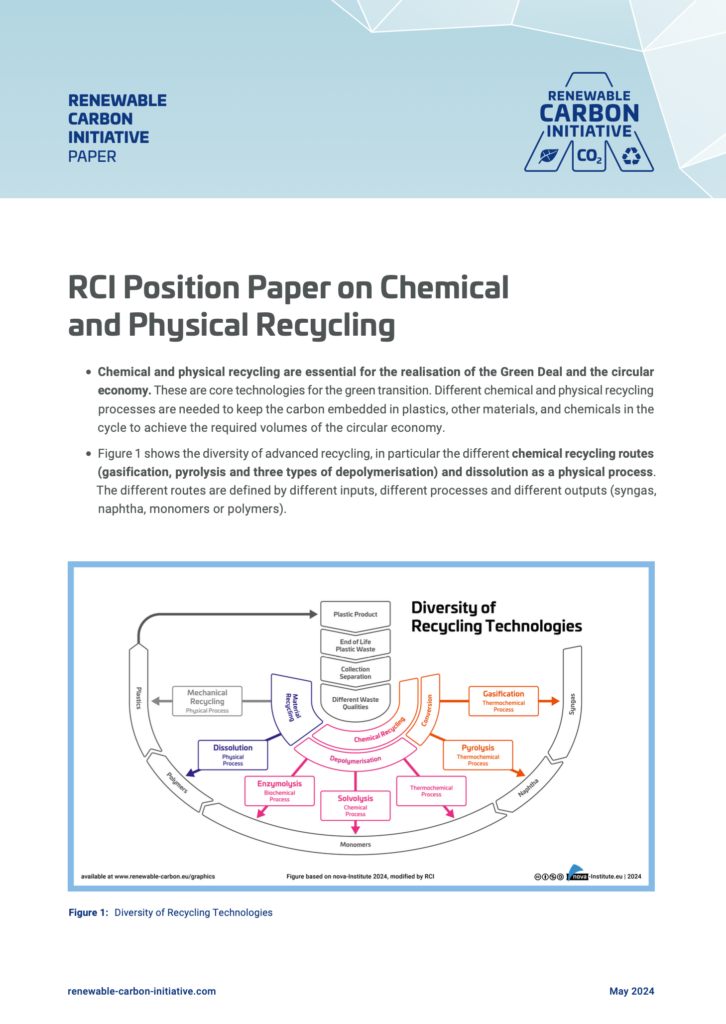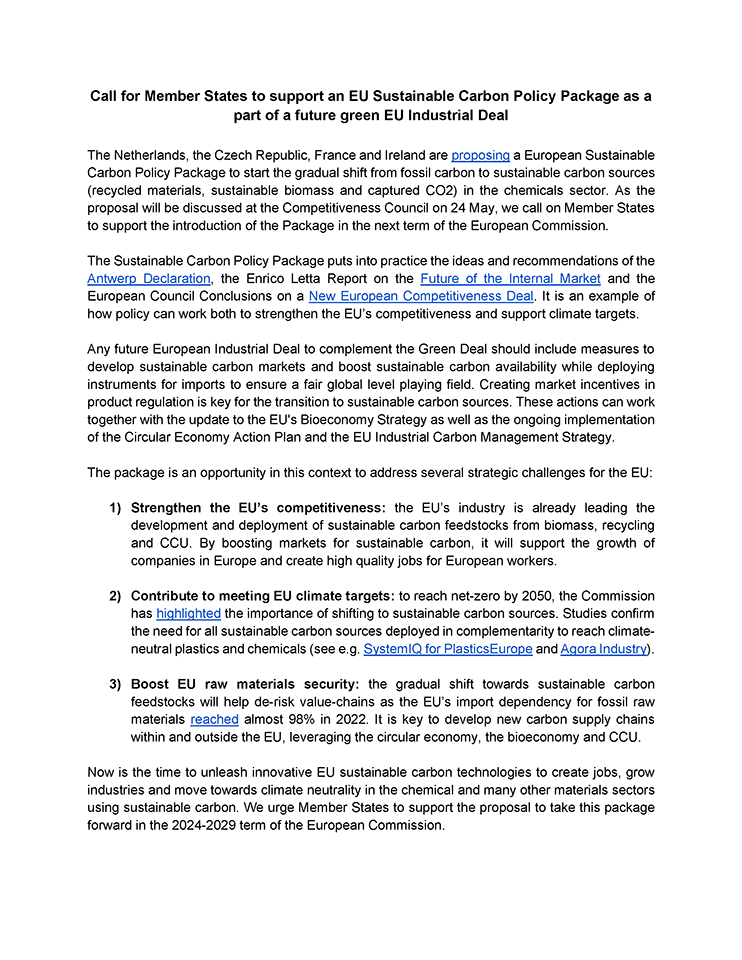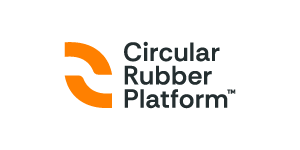
1) RCI’s Position Paper on Chemical and Physical Recycling
On 22 May 2024, RCI has published the position paper “Chemical and Physical Recycling” which are crucial in achieving a green transition. These advanced recycling technologies are essential for building a sustainable and circular economy. The paper outlines the necessary steps to scale up these technologies to maximize their impact.
Why Are These Technologies Crucial?
- Complementary Solutions: Chemical and physical recycling provide essential complements to mechanical recycling by utilising waste streams that would otherwise be destined for incineration or landfill. This diversification of recycling methods ensures that a broader range of plastic waste can be effectively managed and recycled.
- Renewable Carbon Supply: These recycling processes supply renewable carbon to industries reliant on carbon feedstocks, such as the chemical industry. This reduces dependence on fossil carbon sources and supports the transition to sustainable industrial practices.
- Increased Options: Chemical recycling breaks down plastics into their fundamental polymers, monomers, or chemicals, making it possible to recycle contaminated or degraded plastics unsuitable for mechanical recycling. This process enhances the flexibility at the end-of-life, ensuring that carbon remains within the cycle and is continually reused.
- Defossilisation: As part of comprehensive carbon management strategies, chemical recycling contributes to the defossilisation of the chemical industry. By increasing the pathways to keep carbon within the cycle, these technologies support the transition away from fossil-based carbon sources.
Chemical and physical recycling are foundational to establishing a sustainable carbon cycle within the circular economy. Despite their significant potential, substantial investment and supportive policy frameworks are required to fully leverage these technologies.
The RCI’s position paper identifies 11 essential requirements to create stable demand and facilitate the upscaling of these recycling technologies. Key requirements include:
These include general acceptance of the technology; mandatory recycled content for all polymers/plastics in all applications; recognition and clarification of rules for the calculation of recycling rates; full acceptance of mass balance & attribution with fuel-use excluded; accelerated approval of new chemical and physical recycling facilities; expansion of recycling infrastructure for all sectors beyond packaging; and the extension of CO2 pricing for waste incineration in the ETS combined with a landfill ban.
Europe is already witnessing dynamic developments and a general openness towards novel recycling technologies. However, significant efforts are still required to address outstanding details and fully realise the potential of chemical and physical recycling.
Find the complete position paper here: https://renewable-carbon.eu/publications/product/rci-position-paper-on-chemical-and-physical-recycling/
2) Call for Member States to support an EU Sustainable Carbon Policy Package as a part of a future green EU Industrial Deal

The Renewable Carbon Initiative (RCI), in collaboration with BioChem Europe, the Bio-based Industries Consortium (BIC), CO2 Value Europe, European Bioplastics, the Polyolefin Circular Economy Platform (PCEP), and Plastics Europe, has signed a joint industry statement in support of the Member States (MS)-driven push for an EU Sustainable Carbon Policy Package for the upcoming European Commission term.
The Netherlands, the Czech Republic, France, and Ireland are proposing a European Sustainable Carbon Policy Package to transition from fossil carbon to sustainable carbon sources in the chemicals sector. The proposal was discussed at the Competitiveness Council on 24 May and apparently received further support by Spain, Slovakia, Romania, Germany and Greece. The package aims to strengthen the EU’s competitiveness and support climate targets. Any future European Industrial Deal should include measures to develop sustainable carbon markets and increase availability, while deploying import instruments for a fair global playing field. Market incentives in product regulation are crucial for transitioning to sustainable carbon sources. The package addresses strategic challenges for the EU, including strengthening competitiveness, contributing to meeting climate targets, and boosting raw materials security. Find the Joint Statement by the EU Member States at: https://www.government.nl/documents/publications/2024/04/15/joint-statement-on-a-european-sustainable-carbon-policy-package).
This joint statement by the MS is a highly relevant step in the right direction as it shows that there is a real need for a future green EU Industrial Deal that includes measures to support the development of new value chains for producing innovative, bio-based materials. The signatories of the industry statement believe that such a policy package is essential to fostering the growth of sustainable industries, creating jobs, and achieving climate neutrality across the chemical and other material sectors.
Furthermore, the joint statement also highlights the importance of the European Sustainable Carbon Policy Package in unleashing the potential of innovative EU sustainable carbon technologies. This is a really important step towards building a resilient, sustainable economy that can address the pressing challenges of climate change and environmental degradation. By advancing sustainable carbon solutions, the signatory organisations from industry show commitment to driving industrial transformation and ensuring Europe’s leadership in the global shift towards a circular and bio-based economy. Now is the time to act and implement policies that will pave the way for a greener, more sustainable future.
With the joint industry statement, Member States are urged to support the proposal in the 2024-2029 term of the European Commission.
You can find the full industry statement at the renewable carbon platform: https://renewable-carbon.eu/publications/product/call-for-member-states-to-support-an-eu-sustainable-carbon-policy-package-as-a-part-of-a-future-green-eu-industrial-deal-pdf/

3) Launch of “Renewable Carbon Share” label and certification scheme at Renewable Materials Conference 2024
After almost three years of dedicated development by the Renewable Carbon Initiative’s (RCI) working group on labelling, we are excited to announce the upcoming launch of the Renewable Carbon Share (RCS) Certificate & Label. This innovative meta label builds on the existing labelling landscape for bio-based and recycling shares, providing a comprehensive certification for renewable carbon content. Leading the development of this label was TÜV Austria, renowned for their expertise in certification and labelling.
Event Details:
- Date: 11 June 2024
Location: Renewable Materials Conference in Siegburg - Schedule:
- 15:30 CEST – Launch of the OK Renewable Carbon Share Certification Scheme
- Speaker: Philippe Dewolfs, TÜV Austria (BE)
- 16:10 CEST – Ceremony: First Products to Receive the New Renewable Carbon Share Certificate
- Speakers: Philippe Dewolfs, TÜV Austria (BE) and Michael Carus, nova-Institut/RCI (DE)
This event marks a significant milestone in the advancement of renewable carbon labelling, displaying the first products to be awarded the RCS certificate.
Join us in celebrating this achievement and be part of the future of renewable carbon labelling. We look forward to seeing you there!
Get your tickets for the RMC here: https://renewable-materials.eu/registration/
4) RCI Ambassador Activities
RCI was invited to European Commission-led discussions on bio-based plastics and on advancing bio-based products and materials. Within this context, there is currently a clear tendency to explore opportunities on how to boost the bioeconomy and facilitate scaling up and market penetration of bio-based plastics, products and materials. Critical points in the discussion were collaboration among stakeholders, sustainability criteria for biomass, instruments to support market-demand, research and innovation, and methodological aspects e.g. on life-cycle assessment.
5) RCI member portraits

This month, we would like to introduce you to Borealis (AT).
Here are 5 interesting facts about Borealis as shared by Stephan Roest (Strategic Business Platform Leader – Circular Economy Solutions) at Borealis, Austria.
- Circular Products and Solutions: Borealis, based in Austria, is a global leader in providing advanced and sustainable polyolefin solutions, with a specific focus on circular products and solutions. They are actively engaged in addressing the challenge of increasing plastic waste and aiming to defossilise the industry.
- Technological Innovations in Mechanical Recycling: Borealis has developed advanced mechanical recycling technology under the name Borcycle M, which enables the transformation of polyolefin-based waste into new polyolefins. This technology ensures high quality, low odor, and high purity recyclates suitable for a wide range of applications, including healthcare and secondary packaging.
- Chemical Recycling Solutions: In addition to mechanical recycling, Borealis is venturing into chemical recycling solutions under the Borcycle C portfolio. This technology allows for the conversion of low-quality mixed plastic waste streams into synthetic oil, which can substitute fossil feedstock in their existing installations, contributing to a more sustainable production process.
- Renewable Feedstock and Circular Products: Borealis is committed to increasing the capacity of circular products and solutions, including recycled and renewable materials. They aim to achieve a capacity volume of 600 kt by 2025 and 1,800 kt by 2030, demonstrating their dedication to promoting sustainability and circularity in their operations.
- Collaborations and Initiatives: Borealis is actively engaged in collaborations with various industry partners, including other participants of the Renewable Carbon Initiative (RCI). They believe in the importance of cooperation across the entire value chain to drive the transition towards climate neutrality and a circular plastics business model.
Stay tuned for more member portraits and inspiring stories from RCI!
Find out more about Borealis here: https://renewable-carbon-initiative.com/members/borealis-ag/
6) New partner:

This month, the Circular Rubber Platform (NL) became a new partner of RCI. The platform is a global knowledge network on rubber circularity that inspires product developers, engineers and academics with:
- renewable raw materials,
- recovered raw materials from rubber or other sources,
- and high-quality rubber recycling
It was founded in October 2023 by Jan Boomsma and Enrico Koggel, both rubber product engineers, that wanted to engineer technical rubber products with lower carbon footprint. Circular Rubber Platform is a member-based community, meaning that individuals, companies and universities can become member to collaborate and receive frequent updates on new materials and technologies and network in this diverse, global network of specialists. With regular Member Meet-Ups it inspires members with what is already possible and motivates companies to rethink their material usage and rubber scrap or waste.
Why did they join the RCI?
“CRP and RCI are both working towards accelerating the transition towards a circular economy. It is key todefossilise the carbon element in rubber raw materials – by switching out fossil-based carbon with renewable carbon. Together, we will amplify our efforts to stimulate change and innovation on a global scale.”
Source
Renewable Carbon Initiative, original text, 2024-05-31.
Supplier
Borealis Polyolefine AG
Circular Rubber Platform
European Commission
nova-Institut GmbH
Renewable Carbon Initiative (RCI)
TÜV AUSTRIA Group
Share
Renewable Carbon News – Daily Newsletter
Subscribe to our daily email newsletter – the world's leading newsletter on renewable materials and chemicals










